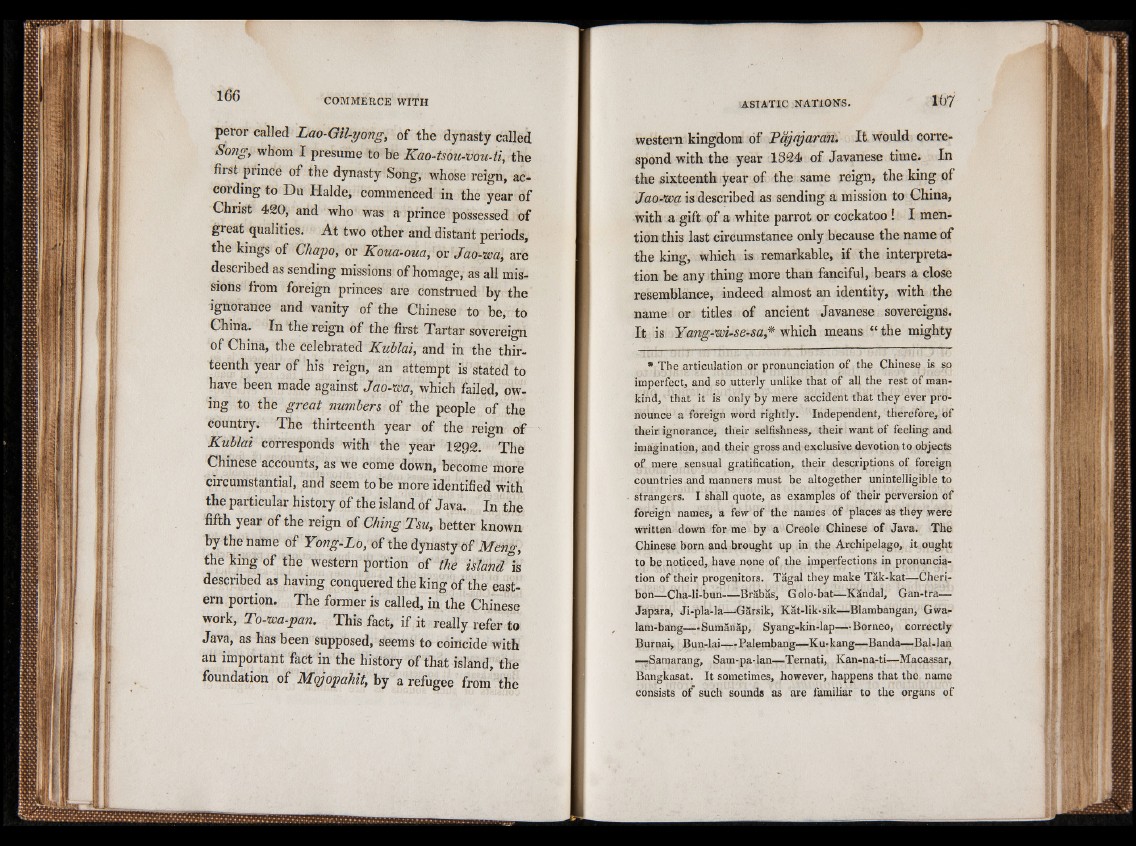
peror called Lao-Gil-yong, of the dynasty called
Song, whom I presume to be Kao-tsou-vou-ti, the
first piince of the dynasty Song, whose reign, according
to Du Halde, commenced in the year of
Christ 420, and who was a prince possessed of
great qualities. At two other and distant periods,
the kings of Chapo, or Koua-oua, or Jao-wa, are
described as sending missions of homage, as all missions
from foreign princes are construed by the
ignorance and vanity of the Chinese to be, to
China. In the reign of the first Tartar sovereign
of China, the celebrated Kublai, and in the thirteenth
year of his reign, an attempt is stated to
have been made against Jao-wa, which failed, owing
to the great numbers, of the people of the
country. The thirteenth year of the reign of
Kublai corresponds with the year 1292. The
Chinese accounts, as we come down, become more
circumstantial, and seem to be more identified with
the particular history of the island of Java. In the
fifth year of the reign of Ching Tsu, better known
by the name of Yong-Lo, of the dynasty of Meng,
the king of the western portion of the i$tand°is
described as having conquered the king of the eastern
portion. The former is called, in the Chinese
work, To-wa-pan. This fact, if it really refer to
Java, as has been supposed, seems to coincide With
ail important fadt in the history of that island, the
foundation of Mojopahit, by a refugee from the
western kingdom of Peg ajar an. It would correspond
with the year 1324 of Javanese time. In
the sixteenth year of the same reign, the king of
Jao-wa is described as sending a mission to China,
with a gift of a white parrot or cockatoo ! I mention
this last circumstance only because the name of
the king, which is remarkable, if the interpretation
be any thing more than fanciful, bears a close
resemblance, indeed almost an identity, with the
name or titles of ancient Javanese sovereigns.
It is Yang-wi-se-sa,* which means “ the mighty
* The articulation or pronunciation of the Chinese is so
imperfect, and so utterly unlike that of all the rest of mankind,
that it is only by mere accident that they ever pronounce
a foreign word rightly. Independent, therefore, of
their ignorance, their selfishness, their want of feeling and
imagination, and their gross and exclusive devotion to objects
of mere sensual gratification, their descriptions of foreign
countries and manners must be altogether unintelligible to
strangers. I shall quote, as examples of their perversion of
foreign names, a few of the names of places as they were
written down for me by a Creole Chinese of Java. The
Chinese born and brought up in the Archipelago, it ought
to be noticed, have none of the imperfections in pronunciation
of their progenitors. Tâgal they make Tak-kat—Cheri-
bon—Cha-li-bun-—Brâbâs, Golo-bat— Kândal, Gan-tra—
Japara, Ji-pla-la—Gârsik, Kat-lik-sik— Blambangan, Gwa-
lam-bang— Sumânâp, Syang-kin-lap— Borneo, correctly
Burnai, Bun-lai— Palembang—Ku-kang—Banda— Bal-lan
— Samarang, Sam-pa-lan—Ternati, Kan-na-ti—Macassar,
Bangkasat. It sometimes, however, happens that the name
consists of such sounds as are familiar to the organs of